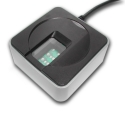Reader rejects severed, fake fingers
Mar 11, 2008 — by Eric Brown — from the LinuxDevices Archive — 1 views Futronic has announced an FBI-approved fingerprint scanner claimed capable of distinguishing live human fingers from dead and fake fingers. The FS88 emits a “special signal” that, in conjunction with a sensor and an algorithm, can reportedly differentiate living finger “signatures” from those of other materials.
Futronic has announced an FBI-approved fingerprint scanner claimed capable of distinguishing live human fingers from dead and fake fingers. The FS88 emits a “special signal” that, in conjunction with a sensor and an algorithm, can reportedly differentiate living finger “signatures” from those of other materials.
(Click here for a larger view of the Futronic FS88)
digg this story |
Futronic says that the FS88 can reject fake fingers made from silicone rubber, Play-Doh, or other materials. And while the company does not claim it outright, the implication is that the device will also reject dead and/or severed fingers. Even living fingers must be positioned very carefully to win the scanner's approval, the company says.
The FS88 is a 2.6 x 2.6 x 1.15 inch box that connects to a PC via the supplied two-meter USB cable. Its LED-illuminated scanning window uses glass that is 14mm thick and resistant to scratches or breakage, according to the company.
The FS88 meets the US Federal Information Processing Standard (FIPS) 201 standard for personal identification verification (PIV) of employees and contractors. It also complies with the FBI's PIV-71006 standard for image quality, according to the company. Finally, Futronic says a unique serial number is programmed into the USB device descriptor of each FS88, making the units traceable when required.
Features and specifications listed by Futronic for the FS88 include:
- Overall dimensions — 2.6 x 2.6 x 1.15 inches
- Weight — 5.3 ounces (150g)
- Scanning window size — 1 x 0.65 inches
- Sensor resolution — 480 x 320 pixels
- Raw fingerprint image file size — 150Kb
- Memory — 16KB, “for application-specific data storage”
- Power requirements and consumption:
- 4.5-5.5VDC via USB port
- <500mW during finger scanning, <200mW in standby, <5mW in sleep mode
- 4.5-5.5VDC via USB port
According to Futronic, the application programming interface (API) for the FS88 supports Linux 2.4 or later on both ARM and x86 platforms. It also supports Windows CE 5.0 and 6.0, Windows XP, and either 32-bit or 64-bit versions of Vista.
The FS88 is available now. Pricing was not listed, but the product appears in the US General Services Administration (GSA) FIPS 201 Evaluation Program Approved Product List, according to the company.
This article was originally published on LinuxDevices.com and has been donated to the open source community by QuinStreet Inc. Please visit LinuxToday.com for up-to-date news and articles about Linux and open source.